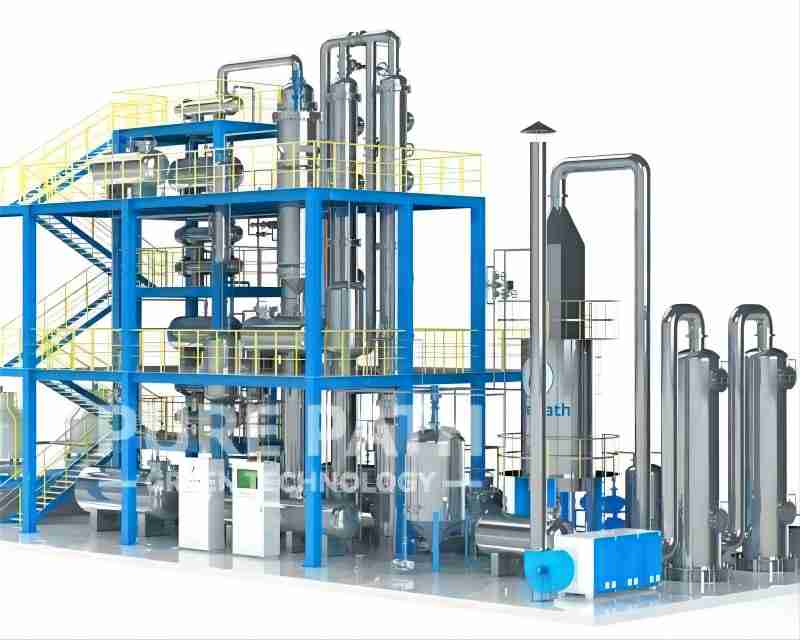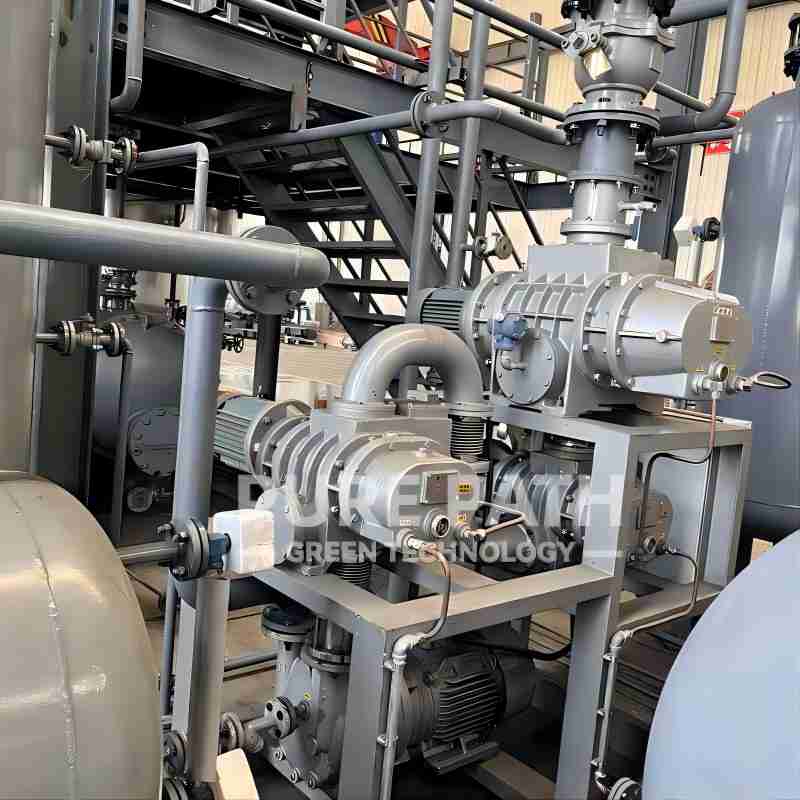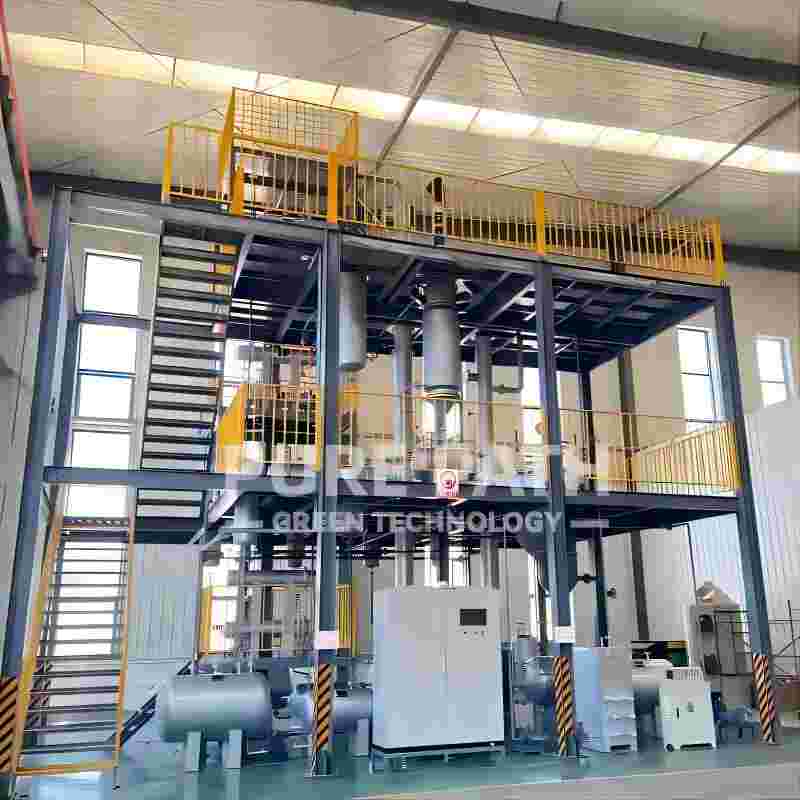Waste Oil to Base Oil: A Sustainable Approach to Recycling and Resource Conservation
Used oil, often referred to as waste oil, is a byproduct of various industrial and consumer activities. It includes used motor oil from vehicles, hydraulic oil from machinery, and other lubricants that have reached the end of their original lifespan. Improper disposal of waste oil poses a significant threat to the environment. This article explores waste oil to base oil recycling, a sustainable solution that offers environmental and economic benefits.

The Dangers of Improper Waste Oil Disposal
Waste oil is a hazardous material. It contains harmful contaminants that can pollute soil and water resources. When improperly disposed of, used oil can seep into the ground, contaminating groundwater used for drinking and irrigation. Oil spills on land can harm plants and wildlife. Improper burning of waste oil releases toxic fumes into the air, causing respiratory problems and other health issues.
Beyond the environmental impact, improper waste oil disposal is also illegal in most jurisdictions. Regulations are in place to ensure responsible handling and disposal of used oil. Failure to comply with these regulations can result in fines and penalties.
Waste Oil to Base Oil Recycling: A Win-Win Solution
Waste oil to base oil recycling offers a sustainable alternative to traditional disposal methods. This process involves treating used oil to remove impurities and contaminants, transforming it into high-quality base oil. Base oil is a key ingredient in the production of various lubricants and greases essential for the smooth operation of machinery across various industries.
Recycling waste oil offers numerous benefits:
- Reduced Environmental Impact: By reusing existing oil, the demand for virgin crude oil extraction is lessened. This translates to a smaller environmental footprint associated with oil exploration, drilling, and transportation.
- Conservation of Resources: Waste oil recycling conserves a valuable natural resource – crude oil. As global oil reserves are finite, recycling helps extend their lifespan.
- Reduced Waste Generation: Waste oil diversion from landfills and improper disposal sites contributes to cleaner environments and reduced waste management burdens.
- Economic Benefits: The market for recycled base oil is growing, creating new business opportunities and economic activity. Companies involved in waste oil recycling contribute to a circular economy model.
The Science Behind Waste Oil to Base Oil Recycling
The process of converting waste oil to high-quality base oil involves several steps. The specific methods used may vary depending on the technology employed by the recycling facility.
Here’s a general overview of the process:
- Pre-treatment: The used oil undergoes initial processing to remove large solid contaminants such as metal shavings and dirt. This pre-treatment step ensures a smoother and more efficient refining process.
- Dehydration: Water contamination is a common issue with used oil. Dehydration removes water from the oil, preventing problems during subsequent processing stages.
- Distillation: The pre-treated oil is heated to high temperatures in a distillation tower. This separates the oil into different fractions based on their boiling points. Lighter components like gasoline and diesel are separated from heavier fractions that will become base oil.
- Solvent Extraction: This step utilizes a solvent to remove remaining impurities and contaminants from the distilled oil fractions. The choice of solvent and the specific extraction process depend on the desired properties of the final base oil product.
- Hydrotreatment: Hydrogen gas is introduced into the oil at high temperatures and pressures in the presence of a catalyst. This process removes sulfur, nitrogen, and oxygen from the oil, further enhancing its quality and stability.
- Final Treatment: The treated oil may undergo additional processes like filtration or clay adsorption to remove any residual contaminants and achieve the desired color and performance characteristics.
The end product of this process is a high-quality base oil that meets industry standards set by organizations like the American Petroleum Institute (API). This recycled base oil can then be used in the production of lubricants and greases, offering a sustainable alternative to lubricants made entirely from virgin crude oil.

The PPGT-BE: A Cutting-Edge Waste Oil to Base Oil Plant
PurePath Technologies offers the PPGT-BE waste oil to base oil plant, a solution specifically designed to address the challenges of waste oil recycling effectively. Here’s what sets the PPGT-BE apart:
- Solvent Extraction Advantage: The PPGT-BE system utilizes a solvent extraction process that eliminates the need for clay refining, a traditional method that generates significant waste products. This translates to a more environmentally friendly recycling process.
- High-Quality Base Oil Production: The PPGT-BE plant is capable of producing base oil that meets or exceeds API Group I+ standards. This ensures the recycled base oil is suitable for various applications requiring high-performance lubricants.
- Low Operating Cost: The PPGT-BE system is designed with operational efficiency in mind. It offers a lower operating cost compared to some traditional recycling methods.
Beyond the core advantages mentioned above, the PPGT-BE plant offers several additional benefits:
- Versatility: The system can handle a wide range of waste oil types, including used motor oil, hydraulic oil, gear oil, and industrial lubricants. This flexibility allows for broader applicability in various industries generating waste oil.
- Modular Design: The PPGT-BE plant is available in modular configurations. This allows for scalability based on specific processing needs. Businesses can start with a smaller system and expand their capacity as waste oil volumes increase.
- User-Friendly Operation: The plant is designed with user-friendly controls and automation features. This minimizes the need for extensive operator training and ensures consistent process control.
- Environmentally Responsible Design: The PPGT-BE system prioritizes environmental responsibility. It incorporates features to minimize emissions, reduce water usage, and promote energy efficiency during operation.
Empowering Sustainability: Beyond the PPGT-BE Technology
PurePath Technologies understands that successful waste oil to base oil recycling extends beyond just the technology. The company offers comprehensive support to its clients, including:
- Feedstock Acquisition Assistance: PurePath can assist clients in establishing a network for collecting and acquiring waste oil feedstock, ensuring a reliable supply for the recycling process.
- Project Planning and Implementation: PurePath provides expertise in planning, permitting, and implementing a waste oil recycling facility tailored to a client’s specific needs.
- Ongoing Support: The company offers ongoing technical support and training to ensure the smooth operation and optimal performance of the PPGT-BE plant.
By partnering with PurePath Technologies and utilizing the PPGT-BE system, businesses can contribute to a more sustainable future. They can responsibly manage their waste oil streams, reduce their environmental footprint, and potentially benefit from new revenue streams generated by the sale of recycled base oil.

Conclusion
Waste oil to base oil recycling offers a compelling solution to the challenges of used oil management. By adopting sustainable practices, businesses can contribute to environmental protection, resource conservation, and a more circular economy. The PPGT-BE plant from PurePath Technologies stands as a testament to innovative technology that can make a significant impact. As the demand for high-quality recycled base oil grows, solutions like the PPGT-BE will play a crucial role in shaping a more sustainable future for our planet.







